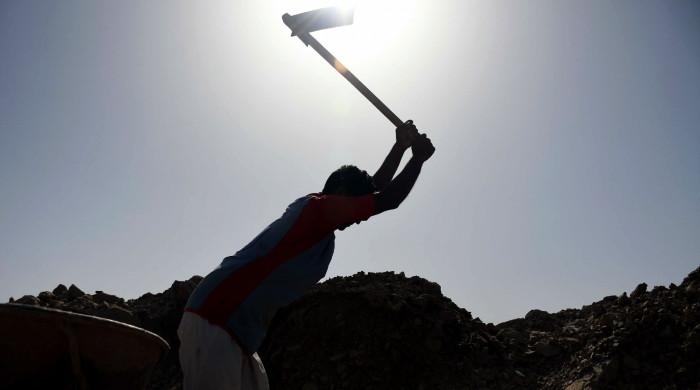The Enduring Legacy of Labour Day: A Call for Justice
The rights we cherish today were hard-won by courageous workers in the streets; Labour Day stands as a testament to their legacy. It’s a day to remember the struggles and celebrate the victories of the labor movement, which gained momentum following the Haymarket Affair in Chicago.
The movement began with a nationwide strike on May 1, 1886, as over 300,000 workers, including 35,000–40,000 in Chicago, demanded an eight-hour workday, protesting against longstanding exploitation.
On May 4, a smaller protest at Haymarket Square faced brutal repression after a bomb exploded, marking a tragic turning point. This day serves as a reminder of the sacrifices made in the fight for fair wages, safer working conditions, and fundamental worker rights. Pakistan, like many nations, acknowledges this day to honor the value of labor and protect these rights. However, while offices are closed and social media is filled with tributes, many laborers continue to toil in silence, underpaid, unprotected, and unheard. We celebrate labor while often failing to uphold its rights.
To understand the present situation, we spoke to representatives from various labor organizations across Pakistan. Here’s what they shared:
Voices from the Front Lines
Chaudhry Saad, General Secretary of the Pakistan United Workers Federation (PUWF), highlighted numerous issues: “Minimum wage laws are not fully enforced, and social security implementation is inadequate. Benefits under the Basic Worker Welfare Fund Act are frequently delayed by 10 to 15 years.”
Safety Concerns
He emphasized the constant neglect of safety:
“Do you see construction workers following safety protocols? Safety laws are widely ignored, and violations are commonplace.”
According to the Punjab Industrial Relations Act (PIRA), workers can form unions. Yet, only 2% of approximately 61 million workers nationwide are unionized.
“I don’t think any law is fully implemented,” Saad stated. “Under the Industrial Relations Act (IRA), every worker should receive an appointment letter, but most don’t. Many also miss out on gratuity. Without an appointment letter, gratuity is impossible. The issues are vast, enough for a book. Courts are our last resort, but the judicial system is slow. Workers suffer as cases drag on.”
Saad recalled a campaign by the Punjab Labour Minister for workers to report unpaid minimum wages.
“But what happened? We haven’t heard of any penalized companies.”
Chaudhry Yaqoob, Chairman of the Muttahida Labour Federation (MTF), shared similar concerns.
“Labour law enforcement is poor,” he stated. “Appointment letters are absent. Minimum wages are enforced only where unions are present. And gratuity is rarely given.”
He explained that most workers aren’t registered with Social Security and EOBI (Employees’ Old-Age Benefits Institution), despite the requirement.
“Terminating a worker requires a proper process: a show-cause notice, a hearing committee. But instead, they’re simply told, ‘don’t come tomorrow.’”
Many employers create fake unions to prevent genuine ones.
“If workers try to form a third union, they need 20% membership support. Employers prevent it and fire those workers if they find out.”
He added that women workers face even tougher conditions. “Even educated women barely survive, often earning no more than Rs20,000 monthly.”
Rabia Razzaque, Senior Programme Officer at the International Labour Organization (ILO), discussed gaps in wage implementation and governance.
“It’s not just the employer’s responsibility. Supply chains have many tiers; the main company doesn’t always oversee contractors. Governance quality varies.”
She expressed concern about retaliation against union organizers.
“Workers have the legal and constitutional right to form trade unions under IRA and ILO conventions. But this right is suppressed structurally and informally.”
Fear, intimidation, and dismissals prevent workers from organizing.
“These cases go to labour courts, highlighting the ongoing crisis of weak enforcement.”
Saad believes meaningful change requires worker representation in Parliament.
“Only industrialists and feudal lords are present. Laws may be passed for show, but without workers, there’s no real implementation.”
He emphasized the need for political will.
“The government recently demolished shops belonging to powerful individuals, showing they can act when they choose. No mafia is above the state; it just requires willpower.”
Yaqoob agreed: “Labour inspections are essential, but currently, they’re non-existent. If they occur, inspectors seek the employer’s permission and make deals. Workers’ voices are never heard.”
“The government doesn’t represent the common man. The dominant class protects its own interests,” he added.
Razzaque outlined the ILO’s efforts to support enforcement in resource-limited countries.
“Our Strategic Compliance Plan fosters social dialogue between workers, employers, and government on enforcement benchmarks.”
She said the ILO is helping employers build compliance frameworks, including transparent records of employment details, pay, evaluations, and growth paths.
In Punjab, digitizing labour inspections has led to “notable improvements.” The ILO is also collaborating with labour departments in Balochistan, Khyber Pakhtunkhwa, and Sindh to develop tailored compliance plans.
However, she cautioned that labour market issues are complex. “We want solutions without investment. The state must step in—build worker capacity, raise rights awareness. This education should start in school.”
As we observe another Labour Day, let’s consider the security guard working long hours for low pay, the bonded labourers, the garment workers without contracts, and the construction workers without safety gear. Workers are the foundation of our economy; if they suffer, we all suffer.



Comments (0)
No comments yet. Be the first to comment!
Leave a Comment